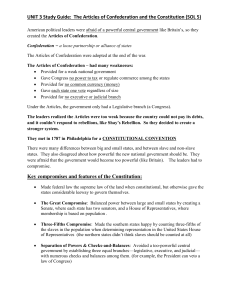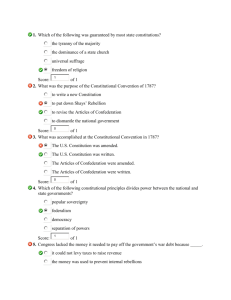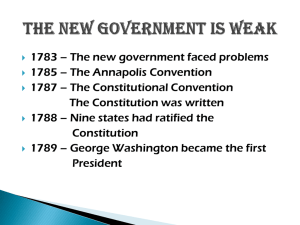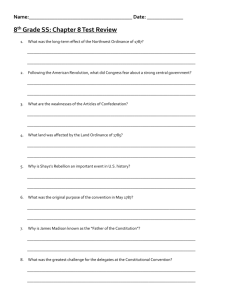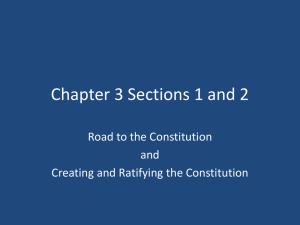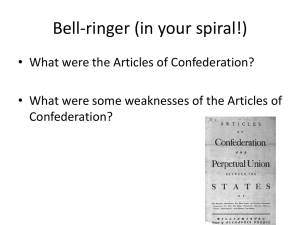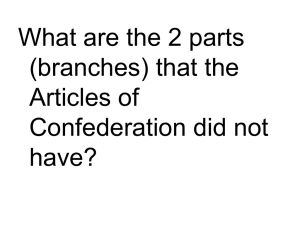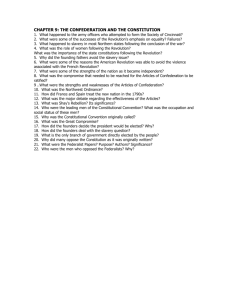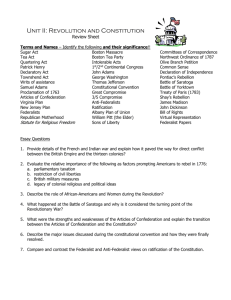Study Guide
advertisement
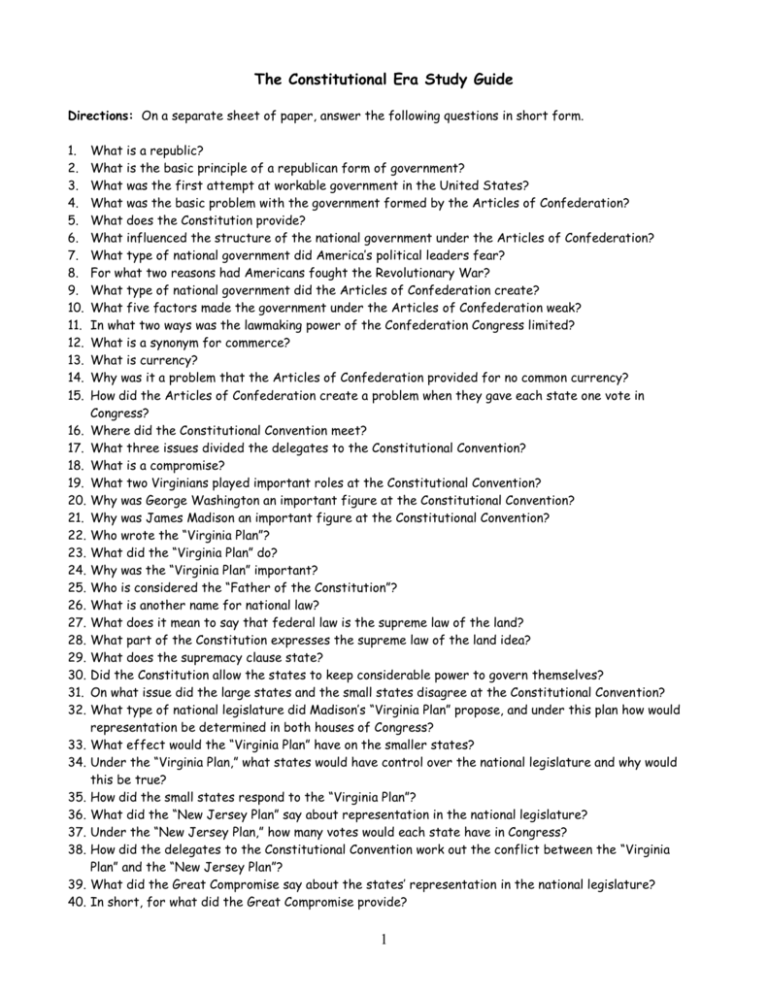
The Constitutional Era Study Guide Directions: On a separate sheet of paper, answer the following questions in short form. 1. 2. 3. 4. 5. 6. 7. 8. 9. 10. 11. 12. 13. 14. 15. 16. 17. 18. 19. 20. 21. 22. 23. 24. 25. 26. 27. 28. 29. 30. 31. 32. 33. 34. 35. 36. 37. 38. 39. 40. What is a republic? What is the basic principle of a republican form of government? What was the first attempt at workable government in the United States? What was the basic problem with the government formed by the Articles of Confederation? What does the Constitution provide? What influenced the structure of the national government under the Articles of Confederation? What type of national government did America’s political leaders fear? For what two reasons had Americans fought the Revolutionary War? What type of national government did the Articles of Confederation create? What five factors made the government under the Articles of Confederation weak? In what two ways was the lawmaking power of the Confederation Congress limited? What is a synonym for commerce? What is currency? Why was it a problem that the Articles of Confederation provided for no common currency? How did the Articles of Confederation create a problem when they gave each state one vote in Congress? Where did the Constitutional Convention meet? What three issues divided the delegates to the Constitutional Convention? What is a compromise? What two Virginians played important roles at the Constitutional Convention? Why was George Washington an important figure at the Constitutional Convention? Why was James Madison an important figure at the Constitutional Convention? Who wrote the “Virginia Plan”? What did the “Virginia Plan” do? Why was the “Virginia Plan” important? Who is considered the “Father of the Constitution”? What is another name for national law? What does it mean to say that federal law is the supreme law of the land? What part of the Constitution expresses the supreme law of the land idea? What does the supremacy clause state? Did the Constitution allow the states to keep considerable power to govern themselves? On what issue did the large states and the small states disagree at the Constitutional Convention? What type of national legislature did Madison’s “Virginia Plan” propose, and under this plan how would representation be determined in both houses of Congress? What effect would the “Virginia Plan” have on the smaller states? Under the “Virginia Plan,” what states would have control over the national legislature and why would this be true? How did the small states respond to the “Virginia Plan”? What did the “New Jersey Plan” say about representation in the national legislature? Under the “New Jersey Plan,” how many votes would each state have in Congress? How did the delegates to the Constitutional Convention work out the conflict between the “Virginia Plan” and the “New Jersey Plan”? What did the Great Compromise say about the states’ representation in the national legislature? In short, for what did the Great Compromise provide? 1 41. What balanced power in Congress between the large and small states? 42. What states had decided to abolish or end slavery in the years immediately following the Revolution? 43. Why had the northern states decided to abolish slavery in the years immediately following the Revolution? 44. What states had decided to keep slavery after the Revolution? 45. Why had the southern states decided to keep slavery in the years after the Revolution? 46. Did the northern states want slaves to be counted when determining the slave states’ membership in the House of Representatives? 47. Did the southern states want slaves to be counted when determining the slave states’ membership in the House of Representatives? 48. What compromise did the northern and southern states make regarding the slave states’ membership in the House of Representatives? 49. How did James Madison answer Americans’ concern about making the national government under the Constitution too powerful? 50. Define the term separation of powers. 51. What three governmental branches did the Constitution create? 52. What is the name of the legislative branch of the federal government? 53. What does the legislative branch do? 54. What official leads the executive branch of the federal government? 55. What does the executive branch do? 56. What court leads the judicial branch of the federal government? 57. What does the judicial branch do? 58. Why did the Constitution include a checks and balance system? 59. Define checks and balances system. 60. How else did the Constitutional Convention try to restrain or check the federal government’s power? 61. How many states had to ratify the Constitution before it could take effect? 62. What does ratify mean? 63. Why was the ratification debate in Virginia pivotal (very important)? 64. Who were the Federalists? 65. Who were the Anti-Federalists? 66. How did the Federalists believe a strong national government could promote economic development and public improvements? 67. Who were the two leading Federalists in Virginia? 68. Why did the Anti-Federalists fear an overly powerful central or national government? 69. Who were the two leading Anti-Federalists in Virginia? 70. Which group wanted a Bill of Rights included in the Constitution? 71. How many states ratified the Constitution, and when did it take effect? 72. Who took responsibility for drafting a Bill of Rights? 73. What two documents did Madison consult when he worked on the Bill of Rights? 74. Who wrote the Virginia Declaration of Rights? 75. What was the main idea of the Virginia Declaration of Rights? 76. Who wrote the Virginia Statute for Religious Freedom? 77. What did the Virginia Statute for Religious Freedom forbid? 78. Which church had been the established church in colonial Virginia? 79. Define the term established church. 80. What basic idea did the Virginia Statute for Religious Freedom support? 81. What is the Bill of Rights? 82. What is a constitutional amendment? 83. What rights are guaranteed by the First Amendment? 2 84. What does freedom of assembly mean? 85. What does the right of petition mean? 86. Did ratification of the Constitution end debate in the United States on the issue of governmental power? 87. Does debate over the meaning of the Constitution still continue today? 88. On what issues are contemporary political debates similar to those of the Federalists and the AntiFederalists? 89. What Americans are heirs to the Federalists’ beliefs? 90. What Americans are heirs to the Anti-Federalists? 91. Define free markets. 3
